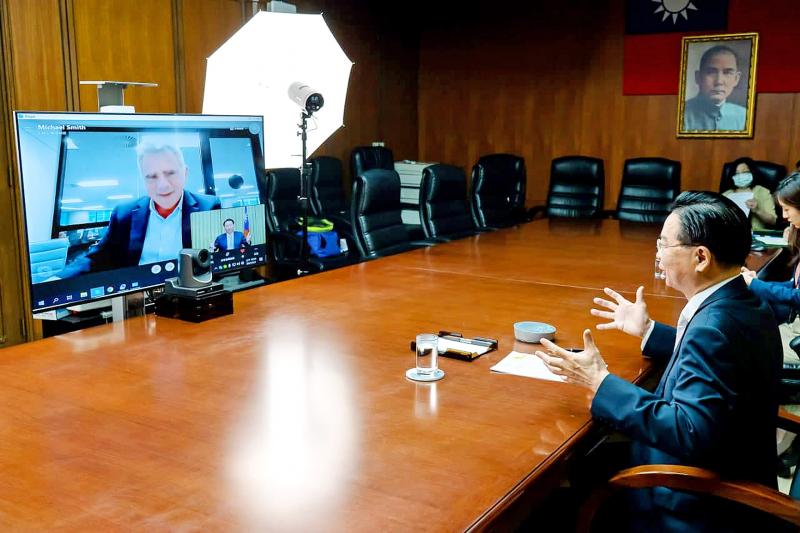In the face of a Chinese “final assault,” Taiwan is looking for tangible Australian support for Taiwanese participation in international affairs, Minister of Foreign Affairs Joseph Wu (吳釗燮) said in an interview with the Sydney-based Australian Financial Review.
Taiwan urges Australia to stand together with Taiwan to fight Chinese President Xi Jinping’s (習近平) expansionism in the democratic world, Wu said in the interview published yesterday.
Wu was interviewed by journalist Michael Smith via videoconference on Tuesday, the Ministry of Foreign Affairs said.

Photo courtesy of the Ministry of Foreign Affairs
While the threat of a Chinese invasion is “not imminent,” a military confrontation with China is a genuine threat that Canberra understands, Wu said.
“China is engaged in isolating Taiwan from the international arena, trying to engage in disinformation ... or hybrid warfare, and intensifying its military threat against Taiwan. [It] seems to be preparing for a final assault against Taiwan,” Wu said.
“I don’t want to say that a war in between Taiwan and China is imminent,” but the Taiwanese government needs to be prepared for it, he said, adding that it is not only the Ministry of National Defense, but the whole government that is preparing for a possible military assault by China.
Taiwanese and Australians both believe in freedom, democracy and human rights, Wu said, adding that he believed that Australians would consider speaking out for Taiwan a good thing.
Taiwan does not want to see China’s definition of order, which is based on aggressive expansionism and authoritarianism, replicated in Taiwan, Wu said.
He urged democratic countries that share the same values to form an alliance to resist Chinese authoritarianism.
Wu called on Canberra to strengthen Taiwan-Australia economic ties and to restart talks for a free-trade agreement, adding that it was possible for Taiwan to apply and join the Trans-Pacific Partnership this year.
Speaking on the issue of a potential Taiwan-Australia military collaboration, Wu said that the issue might be a little overblown.
Taiwan is making preparations for the eventuality of a Chinese invasion, and it is glad to hear that the tough responses of the US, Japan and Australia to Chinese expansionism, he said.
In its most recent foreign affairs and national defense talks with Japan on March 16, the US affirmed the importance of stability and peace across the Taiwan Strait.
Australian Prime Minister Scott Morrison’s government has also increased its hawkish rhetoric against China.
Wu sidestepped the question of whether high-level Taiwanese officials were in dialogue with Morrison or Australian Minister for Foreign Affairs Marise Payne, only saying that the Taiwanese government has been in contact with “some Australian government officials.”
Asked if President Tsai Ing-wen (蔡英文) would talk with Morrison, Wu said that if there is such a plan, it would be kept low-profile.
Taiwan respects the decisions that the Australian government make in its best national interests, he added.
What Taiwan really needs from Australia is its tangible support for Taiwan’s participation in the international community, Wu said.

The Grand Hotel Taipei on Saturday confirmed that its information system had been illegally accessed and expressed its deepest apologies for the concern it has caused its customers, adding that the issue is being investigated by the Ministry of Justice Investigation Bureau. The hotel said that on Tuesday last week, it had discovered an external illegal intrusion into its information system. An initial digital forensic investigation confirmed that parts of the system had been accessed, it said, adding that the possibility that some customer data were stolen and leaked could not be ruled out. The actual scope and content of the affected data

‘LIKE-MINDED PARTNER’: Tako van Popta said it would be inappropriate to delay signing the deal with Taiwan because of China, adding he would promote the issue Canadian senators have stressed Taiwan’s importance for international trade and expressed enthusiasm for ensuring the Taiwan-Canada trade cooperation framework agreement is implemented this year. Representative to Canada Harry Tseng (曾厚仁) in an interview with the Central News Agency (CNA) said he was increasingly uneasy about Ottawa’s delays in signing the agreement, especially as Ottawa has warmed toward Beijing. There are “no negotiations left. Not only [is it] initialed, we have three versions of the text ready: English, French and Mandarin,” Tseng said. “That tells you how close we are to the final signature.” Tseng said that he hoped Canadian Prime Minister Mark Carney

POSITIVE DEVELOPMENT: Japan and the US are expected to hold in-depth discussions on Taiwan-related issues during the meeting next month, Japanese sources said The holding of a Japan-US leaders’ meeting ahead of US President Donald Trump’s visit to China is positive news for Taiwan, former Japan-Taiwan Exchange Association representative Hiroyasu Izumi said yesterday. After the Liberal Democratic Party’s landslide victory in Japan’s House of Representatives election, Japanese Prime Minister Sanae Takaichi is scheduled to visit the US next month, where she is to meet with Trump ahead of the US president’s planned visit to China from March 31 to April 2 for a meeting with Chinese President Xi Jinping (習近平). Japan and the US are expected to hold in-depth discussions on Taiwan-related issues during the

President William Lai (賴清德) yesterday bestowed one of Taiwan’s highest honors on Saint Vincent and the Grenadines (SVG) Ambassador Andrea Clare Bowman in recognition of her contributions to bilateral ties. “By conferring the Order of Brilliant Star with Grand Cordon on Ambassador Bowman today, I want to sincerely thank her, on behalf of the Taiwanese people, for her outstanding contribution to deepening diplomatic ties between Taiwan and SVG,” Lai said at a ceremony held at the Presidential Office in Taipei. He noted that Bowman became SVG’s first ambassador to Taiwan in 2019 and